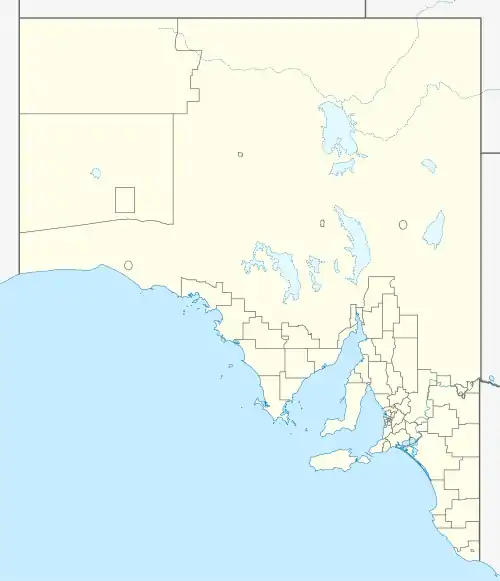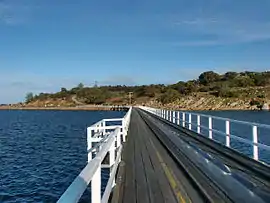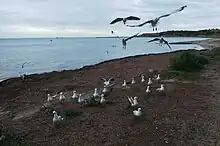| Victor Harbor South Australia | |
|---|---|
 Victor Harbor viewed from Bluff | |
 Victor Harbor | |
| Coordinates | 35°33′0″S 138°37′0″E / 35.55000°S 138.61667°E |
| Population |
|
| Established | 1863 |
| Postcode(s) | 5211[3] |
| Location | 82 km (51 mi) South of Adelaide city centre via |
| LGA(s) | City of Victor Harbor |
| Region | Fleurieu and Kangaroo Island[4] |
| State electorate(s) | Finniss[5] |
| Federal division(s) | Mayo[6] |
Victor Harbor is a town in the Australian state of South Australia located within the City of Victor Harbor on the south coast of the Fleurieu Peninsula, about 82 kilometres (51 mi) south of the state capital of Adelaide. The town is the largest population centre on the peninsula, with an economy based upon agriculture, fisheries and tourism. It is a highly popular tourist destination, with the area's population greatly expanded during the summer holidays, usually by Adelaide locals looking to escape the summer heat.
It is a popular destination with South Australian high school graduates for their end of year celebrations, known colloquially as schoolies.
History

Victor Harbor lies in the traditional lands of the Ramindjeri clan of the Ngarrindjeri people.
Matthew Flinders in HMS Investigator visited the bay on 8 April 1802, while on the first circumnavigation of the continent, mapping the unsurveyed southern Australian coast from the west. He encountered Nicolas Baudin in Le Geographe near the Murray Mouth several kilometres to the east of the present day location of Victor Harbor. Baudin was surveying the coast from the east for Napoleonic France. Although their countries were at war, each captain was given documents by the other nation's government, stating that the ships were on scientific missions, and were therefore not to be regarded as ships of war. Together, the ships returned to the bay and sheltered, while the captains compared notes. Flinders named the bay Encounter Bay after the meeting.
In 1837, Captain Richard Crozier who was en route from Sydney to the Swan River Colony in command of HMS Victor,[7] anchored just off Granite Island and named the sheltered waters in the lee of the island 'Victor Harbor' after his ship.[8] At about the same time, two whaling stations were established, one at Rosetta Head, popularly known as "the Bluff", and the other near the point opposite Granite Island. Whale oil became South Australia's first export. From 1839, the whaling station was managed for a time by Captain John Hart, a later Premier of South Australia. The town of Port Victor was laid out on the shores of Victor Harbor in 1863 when the horse-drawn tramway from Goolwa was extended to the harbour. The last whale was caught off Port Victor in 1872.
The municipality of the town of Victor Harbor was proclaimed on 7 May 1914, with Oliver Alexander Baaner appointed the first mayor.[9]
On 26 December 1936, a one-off motor race meeting was held to the east of the town to commemorate the centenary of South Australia – the South Australian Centenary Grand Prix, often referred to as the 1937 Australian Grand Prix.[10] The circuit was made of public roads, measured 12.6 kilometres in length and featured two long straights, two short straights, and several corners, including the banked Nangawooka Hairpin.[11] The winners of the 240-mile Grand Prix, which was held as a handicap, were Les Murphy in an MG P-type, Tim Joshua in another P-type, and Bob Lea-Wright in a Terraplane Special.[10]
The beaches of Victor Harbor and nearby Port Elliot have been facing rising seas and more has to be done to stop this.[12]
Town name
The spelling of Victor Harbor, spelled without a u is a curiosity as harbour normally retains the "u" in Australian English. This spelling is found in several geographical names in South Australia, including Outer Harbor or Blanche Harbor. The township of Victor Harbor was proclaimed in 1914 with the spelling "Harbor".[13] The harbour was proclaimed on 27 May 1915 under the Harbors Act 1913,[14] and its name established on 15 June 1921 as "Victor Harbor".[15]
The name of the harbour was changed from Port Victor as a result of a near shipwreck blamed on confusion with Port Victoria on the Yorke Peninsula.[16][17] According to the State Library of South Australia, the lack of the "u" is not influenced by American spelling, but archaic English spelling.[17] The name is not consistently applied. The Victor Harbor Times used "Harbour" in its masthead from 1922 to 1978, before reverting to "Harbor".[18] The Victor Harbour railway station is spelt with the u.[19]
Population
In 2016, the resident population in the town of Victor Harbor was 4,233.[1] Over the summer holiday season the population almost triples.[20] In June 2018, the urban population for the built-up coastal area extending from Victor Harbor to Port Elliot and nearby Goolwa was 26,503,[21] It had increased at an average annual rate of 1.07% year-on-year over the preceding five years. The population of the local government area of the City of Victor Harbor is 14,954.[2]
Governance
Victor Harbor was declared a city in 2000.[22] As a local government area, the City of Victor Harbor includes the surrounding rural area and the contiguous township of Encounter Bay as well as the town of Victor Harbor itself. Its total area is 34,463 hectares. It shares boundaries with the District Council of Yankalilla and Alexandrina Council. The city is in the state electoral district of Finniss and the federal Division of Mayo.
Economy
In November 2023, Victor Harbor mayor Moira Jenkins voiced strong opposition, citing risks to the environment, to a proposal for a $350 million marina in the town.[23] The project is promoted by local businessman Mark Taplin, who has stated that he wants to "enhance Victor Harbor."[24]
Attractions




A popular site for visitors is Granite Island, which is connected to the mainland by a short tram/pedestrian causeway. The tram service is provided by the Victor Harbor Horse Drawn Tram, one of the very few horse-drawn tram routes remaining in public transit service. Granite island is home to a large colony of little penguins which are a popular attraction on the island. These penguins shelter on the island during the night, departing in the morning to hunt for fish before returning at sunset. Sadly this colony of penguins is now almost gone. At the last count in 2012, only seven were found. It is suspected that an increase in long-nosed fur seals in the area may be to blame, however incidents such as those in 1998 where locals apparently kicked several of them to death have also contributed.[25]
The SteamRanger Heritage Railway runs train services, most notably The Cockle Train between Victor Harbor and Goolwa, along the Victor Harbor railway line.
Between June and September, whale spotting is a popular attraction. Southern right whales come to the nearby waters to calve and to mate. The South Australian Whale Centre located at Victor Harbor, provides hands-on interactive activities and presentations as well as information and whale watching tips.[26] Greenhills Adventure Park offered activities including: waterslides, canoes, rock wall climbing, archery, mini golf, and go-karting, however this attraction has since closed down.
Victor Harbor is the centre of the surf zone known as the "South Coast" to Adelaide and local surfers. Popular surf beaches in the area include Parsons, Waitpinga, Middleton and Goolwa. The Granite Island breakwater usually shields the town from waves. Victor Harbor offers numerous fishing opportunities, varying from offshore reefs for larger boat based anglers to excellent surf fishing on the beaches closer to the Murray Mouth.
The 'Urimbirra Wildlife Park' is a local attraction with a considerable collection of native, and some domestic, animals. The marsupial mammals at the park are koalas, southern hairy-nosed wombats, red kangaroos, western grey kangaroos, agile wallaby, parma wallaby and black-striped wallaby. Other mammals include short-beaked echidnas, dingoes, grey-headed flying foxes, alpacas and domestic sheep. Reptiles include saltwater crocodile, freshwater crocodile, lace monitor, eastern water dragon, inland bearded dragon, eastern blue-tongued lizard, shingleback lizard, carpet python, tiger snake, eastern brown snake and red-bellied black snake. Birds include emus, southern cassowary, wedge-tailed eagle, eastern barn owl, tawny frogmouth, laughing kookaburras, sulphur-crested cockatoos, brush turkey and many others.
Media
The main newspaper printed locally is the Times (1987–). The newspaper was originally published as The Victor Harbor Times and Encounter Bay and Lower Murray Pilot, with the first edition published on Friday 23 August 1912.[27] On 16 May 1930, the title was briefly altered to Times Victor Harbor and Encounter Bay and Lower Murray Pilot.[28] From 15 April 1932 until 31 December 1986 it was called Victor Harbor Times.[29]
Other historical publications included the short-lived South Coast News (4- 25 June 1965), printed by A.H. Ambrose,[30] and its "successor", South Coast Sports News (20 June – 4 July 1969), printed by The Ambrose Press.[31]
Festivals and events
This town hosts a three-day schoolies festival in late November mainly for South Australian school leavers. Victor Harbor hosts the second largest schoolies festival in Australia after the Gold Coast, centring around official festival activities in Warland Reserve.
These events are managed by the official event organisers and not-for-profit charity, Encounter Youth, and are supported by the local council, SA Police, SA Ambulance and St Johns SA.[32]
The centre of the town is a dry area (no alcohol) at night and during the Christmas Pageant and New Year's Eve.[33]
Another notable event is the Art Show run by the Rotary Club of Victor Harbor and exhibits of paintings are shown from all over Australia. The event is held in January, during the summer holidays, and the 40th Art Show was held in January 2019.[34] It has grown to become Australia's largest outdoor art exhibition, with more than 10,000 people attending over 9 nine days.[35]
Climate
Victor Harbor has a warm summer Mediterranean climate (Köppen: Csb).[36] Summer average temperatures are significantly lower than most of the state, due largely to the sea breeze moderating temperatures and hot northerlies rarely extending past the hills north of the city.
| Climate data for Victor Harbor (5m ASL) | |||||||||||||
|---|---|---|---|---|---|---|---|---|---|---|---|---|---|
| Month | Jan | Feb | Mar | Apr | May | Jun | Jul | Aug | Sep | Oct | Nov | Dec | Year |
| Record high °C (°F) | 44.0 (111.2) |
43.0 (109.4) |
41.6 (106.9) |
35.5 (95.9) |
28.9 (84.0) |
24.6 (76.3) |
26.0 (78.8) |
26.7 (80.1) |
33.7 (92.7) |
38.0 (100.4) |
41.1 (106.0) |
42.0 (107.6) |
44.0 (111.2) |
| Mean daily maximum °C (°F) | 24.5 (76.1) |
24.4 (75.9) |
23.4 (74.1) |
20.9 (69.6) |
18.4 (65.1) |
15.9 (60.6) |
15.4 (59.7) |
16.2 (61.2) |
18.2 (64.8) |
20.2 (68.4) |
21.7 (71.1) |
23.4 (74.1) |
20.2 (68.4) |
| Daily mean °C (°F) | 19.8 (67.6) |
19.9 (67.8) |
18.8 (65.8) |
16.4 (61.5) |
14.3 (57.7) |
12.2 (54.0) |
11.6 (52.9) |
12.1 (53.8) |
13.6 (56.5) |
15.3 (59.5) |
17.0 (62.6) |
18.6 (65.5) |
15.8 (60.4) |
| Mean daily minimum °C (°F) | 15.1 (59.2) |
15.3 (59.5) |
14.2 (57.6) |
11.9 (53.4) |
10.1 (50.2) |
8.4 (47.1) |
7.7 (45.9) |
8.0 (46.4) |
9.0 (48.2) |
10.4 (50.7) |
12.2 (54.0) |
13.8 (56.8) |
11.3 (52.3) |
| Record low °C (°F) | 8.2 (46.8) |
8.8 (47.8) |
6.2 (43.2) |
3.2 (37.8) |
0.9 (33.6) |
0.0 (32.0) |
0.1 (32.2) |
1.5 (34.7) |
2.4 (36.3) |
2.9 (37.2) |
5.0 (41.0) |
7.3 (45.1) |
0.0 (32.0) |
| Average rainfall mm (inches) | 20.8 (0.82) |
19.6 (0.77) |
22.9 (0.90) |
43.0 (1.69) |
61.6 (2.43) |
71.2 (2.80) |
74.8 (2.94) |
67.4 (2.65) |
56.2 (2.21) |
45.5 (1.79) |
28.0 (1.10) |
24.1 (0.95) |
535.1 (21.05) |
| Average rainy days (≥ 0.2 mm) | 4.5 | 4.4 | 6.4 | 10.1 | 13.7 | 15.3 | 16.5 | 16.3 | 13.6 | 11.4 | 7.8 | 6.5 | 126.5 |
| Average relative humidity (%) | 60 | 60 | 62 | 62 | 66 | 69 | 67 | 63 | 63 | 59 | 57 | 61 | 62 |
| Source: Australian Government, Bureau of Meteorology[36] | |||||||||||||
References
- 1 2 Australian Bureau of Statistics (27 June 2017). "Victor Harbor (State Suburb)". 2016 Census QuickStats. Retrieved 20 April 2018.
- 1 2 "3218.0 – Regional Population Growth, Australia, 2016: Population Estimates by Statistical Area Level 2 (ASGS 2016), 2017 to 2018". Australian Bureau of Statistics. Australian Bureau of Statistics. 27 March 2019. Retrieved 4 November 2019. Estimated resident population, 30 June 2018.
- ↑ "Victor Harbor, South Australia". Postcodes Australia. Retrieved 2 August 2015.
- ↑ "Fleurieu Kangaroo Island SA Government region" (PDF). The Government of South Australia. Retrieved 17 April 2017.
- ↑ "District of Finniss Background Profile". ELECTORAL COMMISSION SA. Retrieved 2 August 2015.
- ↑ "Federal electoral division of Mayo, boundary gazetted 16 December 2011" (PDF). Australian Electoral Commission. Retrieved 2 August 2015.
- ↑ HMS Victor, 1814, Index of 19th Century Naval Vessels, www.pbenyon.plus.com/18-1900
- ↑ South Australian State Gazeteer
- ↑ Established as "Victor Harbor". "Municipality of Victor Harbor Constituted" (PDF). Retrieved 18 June 2019. The South Australian Government Gazette, 1914, page 1165, 28 May 1914.
- 1 2 Walker, Terry (1995). Fast Tracks – Australia's Motor Racing Circuits: 1904–1995. Wahroonga, NSW: Turton & Armstrong. p. 170. ISBN 0908031556.
- ↑ Galpin, Darren. "Victor Harbor". GEL Motorsport Information Page. Retrieved 1 April 2016.
- ↑ Peddie, Clare (30 October 2021). "Sea surge sending either bowls or beaches to the wall". The Advertiser.
- ↑ "Municipality of Victor Harbor Constituted" (PDF). Retrieved 18 June 2019. The South Australian Government Gazette, 1914, page 1165, 28 May 1914.
- ↑ "HARBOR PROCLAIMED UNDER THE HARBORS ACT, 1913" (PDF). Retrieved 20 June 2019. The South Australian Government Gazette, 1915, page 331, 15 July 1915.
- ↑ "HARBOR PROCLAIMED UNDER THE HARBORS ACT, 1913" (PDF). Retrieved 20 June 2019. The South Australian Government Gazette, 1921, page 1267, 16 June 1921.
- ↑ "Naming of Our Town". Retrieved 20 June 2019. Victor Harbor Times, 27 September 1963, page 4.
- 1 2 "Victor Harbor or Victor Harbour?". Retrieved 20 June 2019. State Library of South Australia SA Memory.
- ↑ Editions 8 September 1922 to 22 March 1978. "Refer digital copies of paper at Trove". Retrieved 20 June 2019.
- ↑ "Why is Victor Harbor spelt without the 'u'?". Archived from the original on 12 March 2011.
- ↑ Victor Harbor Urban Growth Management Strategy 2008–2030 prepared by Nolan Rumsby Planners
- ↑ "3218.0 – Regional Population Growth, Australia, 2017-18: Population Estimates by Significant Urban Area, 2008 to 2018". Australian Bureau of Statistics. Australian Bureau of Statistics. 27 March 2019. Retrieved 25 October 2019. Estimated resident population, 30 June 2018.
- ↑ Harbor, City of Victor (3 February 2017). "Council Information". City of Victor Harbor – via victor.sa.gov.au.
- ↑ "Mayor vows to be 'first one to lie in front of a bulldozer' to prevent marina project". ABC News. 6 November 2023. Retrieved 6 November 2023.
- ↑ "Mayor vows to be 'first one to lie in front of a bulldozer' to prevent marina project". ABC News. 6 November 2023. Retrieved 6 November 2023.
- ↑ "Island security under review". Times. 25 June 1998. p. 1. Retrieved 17 August 2015.
- ↑ South Australian Whale Centre Accessed 3 September 2012.
- ↑ "The Victor Harbor Times and Encounter Bay and Lower Murray Pilot (SA : 1912–1930)". Trove. Retrieved 24 February 2018.
- ↑ "Times Victor Harbour and Encounter Bay and Lower Murray Pilot (SA : 1930–1932)". Trove. Retrieved 24 February 2018.
- ↑ "Victor Harbour Times (SA : 1932–1986)". Trove. Retrieved 24 February 2018.
- ↑ South Coast news [newspaper: microform]. Victor Harbour, S. Aust: A.H. Ambrose. 1965.
- ↑ South Coast sports news [newspaper: microform]. Victor Harbor, S. Aust: The Ambrose Press. 1969.
- ↑ "Schoolies Festival™ Victor Harbor". Encounter Youth. Retrieved 11 September 2018.
- ↑ Harbor, City of Victor (8 March 2014). "Dry Areas". City of Victor Harbor – via victor.sa.gov.au.
- ↑ "The Victor Harbor Art Show 2020". victorharborartshow.com.au.
- ↑ "Victor Harbor Art Show". 17 October 2016.
- 1 2 "Climate Data Online for Victor Harbor (Weather station closed 01 Apr 2002)". Australian Government, Bureau of Meteorology. Retrieved 14 January 2018.
Further reading
- Hodge, Charles R. (Charles Reynolds) (1930), Guide-book to Victor Harbour, the miniature Naples of Australia and the south coast, C.R. Hodge, retrieved 18 March 2018